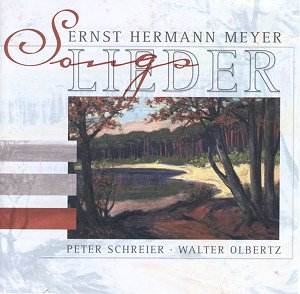- Preisend den Frieden
- In ihrer Schönheit
- Mir träumte wieder der alte Traum
- Im Ernst
- König Wiswamitra
- Ich wollte bei dir wellen
- Ich hätt der nimmermehr gedächt
- An die Musik
- Schuld
- Wenn der Sturm
- Reife Tage
- Wanderers Nachtlied
- Mittel-Alter
- Spielt der Herbst sein Trists Lied
- Der Gast
- Weihnacht
- Weihnachtsabend
- Schwere Stunden
- Zerquälte Zeit
- Huldigung
- Seit wir beieinander sind
- Vollmond
- Das Geheimnis
- Ehre
- Was weiß denn ich, wie lang ...
Meyer was a composer much associated with the communist
establishment in the German Democratic Republic. He spent fifteen years
(1933-1948) in English exile. There he was befriended by Alan Bush conducting
workers' choirs, working as a musicologist and studying English chamber
music (on which he wrote a book in 1946). His post-war return to the
GDR saw his appointment as professor of musicology at Humboldt University
as well as an upward succession of official musical and cultural positions.
He remained a lifelong convinced communist much as his friend Alan Bush
in England. Whereas Bush suffered exclusion for his openly held convictions
Meyer blossomed and attracted commission after commission in the sympathetic
environment of the GDR.
Amongst his many works there are three hundred songs.
These continue the orthodox tradition of the lied but graft onto it
social responsibility and mildly expressionistic dissonance. The softened
discords you will detect from hearing these songs. The social dimension
(and here I rely on the notes) is only apparent in the words of two
of the twenty-five songs and then it is neither belligerent nor hectoring.
Listening to these songs I would place Meyer as a traditionalist whose
use of dissonance is subordinated to his fidelity to the very same German
art-song tradition traced from Schubert to Wolf to Reger to Pfitzner.
His is a strongly melodic voice touched with the darkness and with the
pessimism you find in Schoeck and which predominated in the recently
reviewed Guild collection of songs by Swiss composers. Whether calculated
or not these songs strike me as private inward statements with some
nostalgia for the golden age of German fields, forests and hills. That
nostalgia can also be traced, but even more strongly, in Hanns Eisler's
Hollywood songs (a Decca collection sung by Mathias Goerne).
The featured songs are settings of Johannes R. Becher,
Eva Strittmatter, Louis Fürnberg, Annemarie Bostroem, Willi Layh,
Theodor Fontane and Günther Deicke. Mixed among these are Goethe
and Heine settings and one song each from Byron and Herrick.
So many of these songs reflect remorse, sadness, rain-clouded
landscapes and plaintive voices. Preisend den Frieden deploys
a shadowed lyricism with touches of Britten yet more emotional than
the British composer. A quiet watery ostinato and a precise lyricism
returns also for track 25 in a haze of gentle dissonance. 8 is a serenade
in a rain-clouded landscape recalling the words 'Gone, gone is summer
the lovely' from Arthur Bliss's Seven American Poems. This is
a lovely song that deserves to appear in anthologies and recitals; similarly
Was weiss (tr 25). Other songs bear the impress of protest (9),
triumph (10), November nights in graveyards (17) sad serenade (14).
15 21 and 22 are more expressionist settings with part sung part spoken
commentary. 23 is easier but still reflective of a darkening landscape
with louring clouds. Winter Serenade (16) is influenced by English troubadour
school shaped by Warlock, Gurney and Finzi. There are traces of this
in Huldigung as well as in 24.
Meyer is fortunate in both Schreier whose voice I idolise
as much as that of Ian Partridge, Thomas Hampson and Gerald English
and in Olbertz.
Well designed booklet. The notes by Antje Hinz are
in German. These are also in English in the usual polished translation
from the Berridges. No texts.
Rob Barnett


